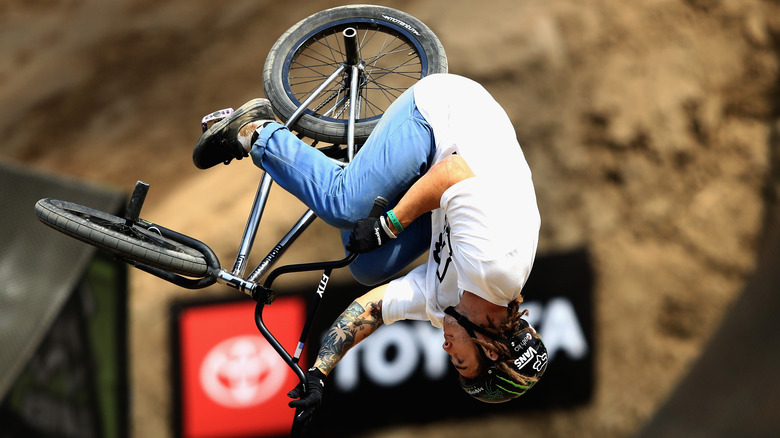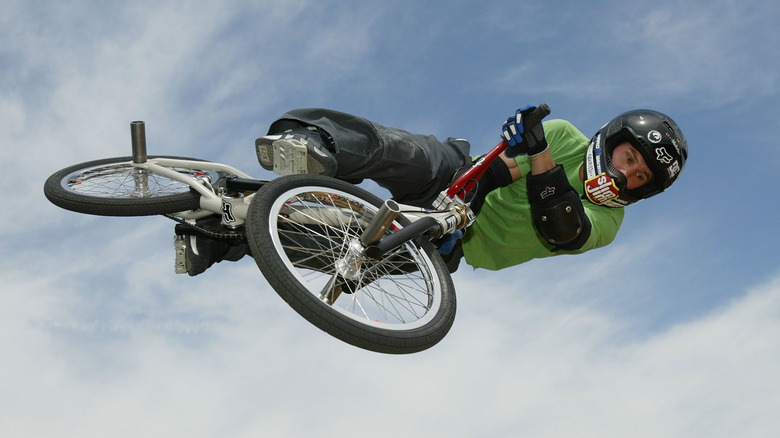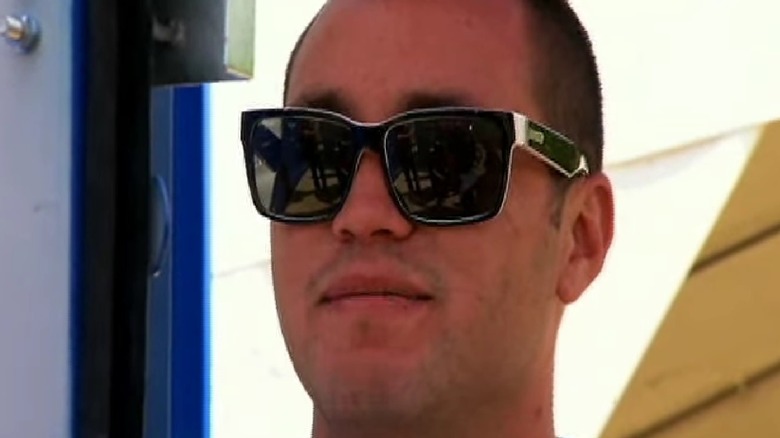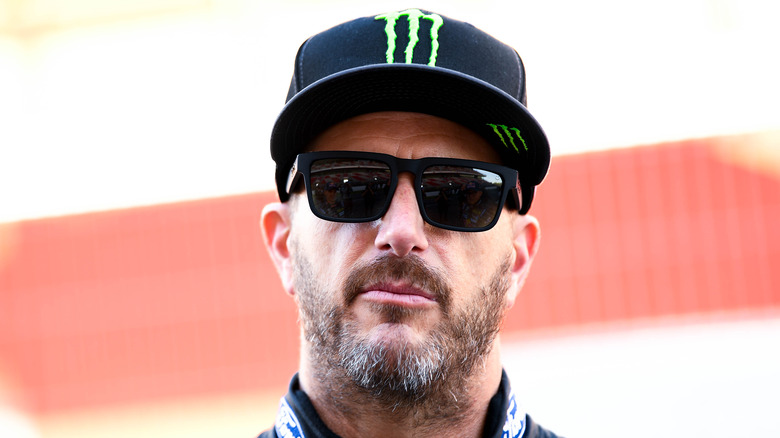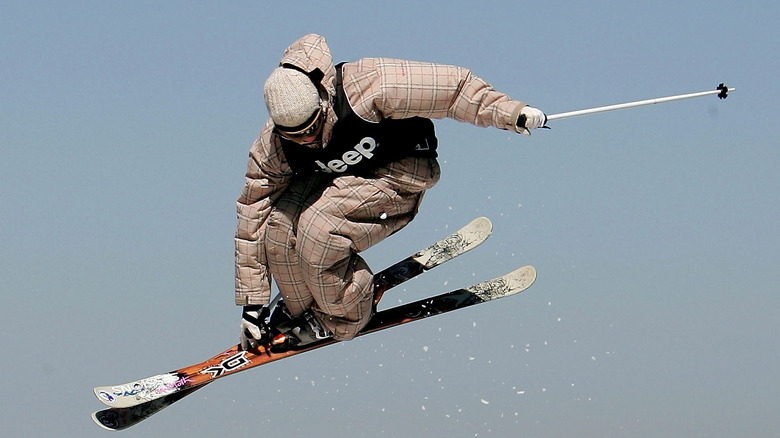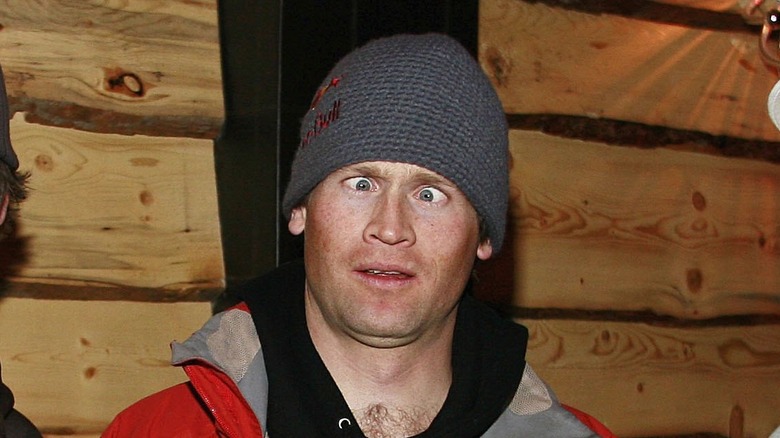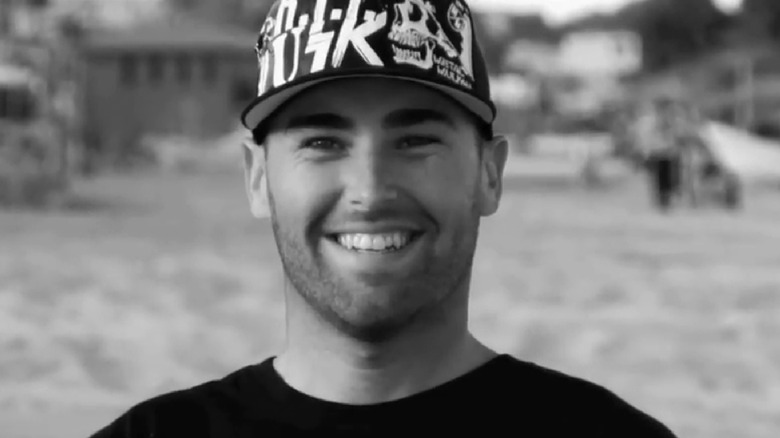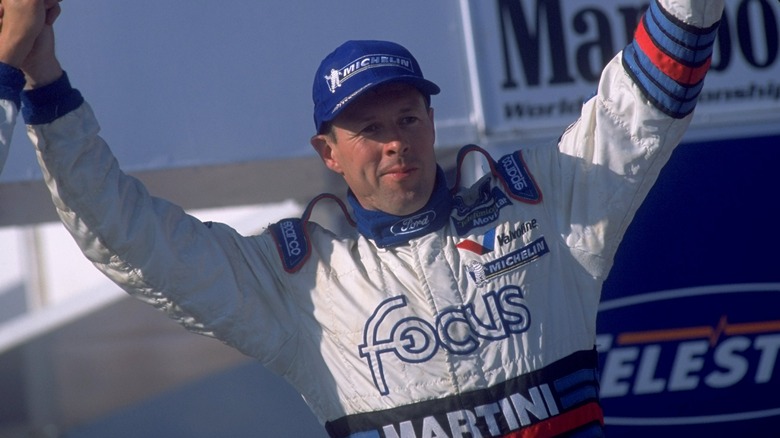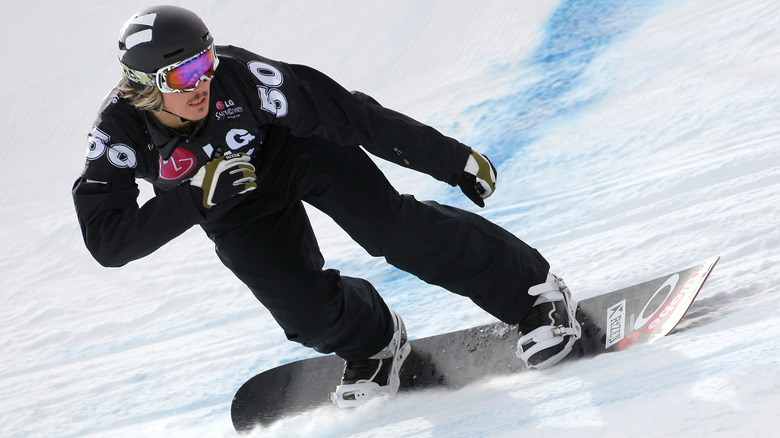X Games Athletes Who Died Too Young
In 1995, ESPN announced the birth of a new type of televised sports competition: The Extreme Games, which were held at four locations in Rhode Island and Vermont. Contestants would compete in 27 categories, across nine disciplines: Biking, Bungee Jumping, Eco-Challenge, In-Line Skating (commonly known as Rollerblading), Skateboarding, Skysurfing (a jaw-dropping combination of skydiving and snowboarding), Sport Climbing, Street Luge, and Water Sports. It was further announced that the plan was for this new competition to take place every two years — but those plans quickly changed. Due to a rabidly positive response from the extreme sports community and its viewers, the network quickly upgraded the event to a yearly one, and in only its second year, it was given a name change as well, becoming known as the X Games.
The 1996 event drew a whopping 200,000 spectators, and in the years since, iconic competitors like skateboarding great Tony Hawk, BMX rider Mat Hoffman, and snowboarding legend Mark McMorris have kept fans on the edge of their seats with their near-superhuman feats of athleticism. But by definition, extreme athletes are folks who are prone to engaging in extremely risky behavior — and in the nearly three decades since the X Games came into existence, more than a few of its most beloved participants have departed for the great halfpipe in the sky far too soon.
Pat Casey
BMX rider Pat Casey, a veteran of the Vans team, was an absolute monster on two wheels. Casey was the very definition of an innovator — a man with an incredibly deep bag of tricks, twists, and flips, and an expert transition rider, meaning that he virtually never failed to stick the landing.
Turning pro at just 14, Casey promptly began attracting attention for his sublime skills, and at the X Games, he medalled three times — taking bronze in the BMX Freestyle Park event in 2012, silver in 2013, and gold in 2021. Casey had the kind of career that speaks to a tireless dedication to the sport of BMX — and it was during a 2023 practice run that he unfortunately lost his life.
On June 7, NBC San Diego reported that Casey had been involved in an accident at Slayground Motocross Park in Ramona, California, a training and sometime event facility owned by fellow X Games star Axell Hodges. Shockingly, Casey missed his landing while completing a jump on a motorcycle, landing askew and causing the bike to fall on top of him. Emergency responders arrived quickly, but were unable to help Casey, who died at the scene. In an Instagram post, the 29-year-old's wife, Chase, movingly eulogized her husband. "The world looked at you the way you looked at me," she wrote. "Our children are strong, and I know that's because of you."
Sarah Burke
29-year-old Sarah Burke was, by just about any metric, the best women's freestyle skier on the planet. She pioneered the superpipe event, which is as hardcore as it sounds: a halfpipe up to 22 feet tall and 64 feet wide, with a length of at least 400 feet. The superpipe can dominate the most talented of extreme skiers, but Burke dominated it instead.
Not only did she take home four gold medals at the X Games, she was the owner of five World Cups and multiple world championships; the year before her 2012 death, her gold medal in the Euro X Games came when she stuck a virtually unheard-of 540. Shockingly, her death came during a simple practice run in Utah, after a comparatively routine crash of the sort that she'd likely endured countless times before — but this time, the awkward landing resulted in catastrophic injury.
Specifically, Burke tore her vertebral artery on the landing, causing severe bleeding, depriving her brain of oxygen, and causing her to go into cardiac arrest. She was airlifted to a Salt Lake City Hospital, where she held on for nine days before succumbing to her injury. Over a decade later, she is still remembered as one of the best to ever put on a pair of skis. Said Jeremy Forster, program director for U.S. Freeskiing,"[Burke] constantly inspired [her peers] to do greater things ... She was a leader in her sport, and it's a huge loss for the freeskiing community" (via CBS News).
Dave Mirra
Fourteen-time X Games gold medalist Dave Mirra wasn't just a BMX icon; he virtually defined his sport, winning championships, setting records, and blazing trails both literal and figurative throughout his era. He was a two-time Olympian, taking home a silver medal in the 1996 games in Atlanta, and he was even a television personality; after landing a double backflip for the first time ever on a 2002 episode of MTV's "True Life," the network enlisted him to host the reality series "Real World/Road Rules Challenge" from 2004 to 2005. He was simply a giant of extreme sports — but behind the scenes, he was quietly struggling with a terrible health issue.
Mirra suffered a fractured skull in a car accident at the tender age of 19, and this — combined with the many concussions he sustained over the course of his BMX career — is thought to have contributed to his CTE, a degenerative brain disorder common to football players, per the Mayo Clinic. The diagnosis was confirmed after Mirra's death; in 2016, at the age of 41, Mirra died by suicide after years of dealing with depression and memory loss due to his condition.
If you or anyone you know is having suicidal thoughts, please call the National Suicide Prevention Lifeline by dialing 988 or by calling 1-800-273-TALK (8255).
Kyle Smaine
South Lake Tahoe's Kyle Smaine was seemingly born in a halfpipe, and whether on skis or a snowboard, he attacked them fearlessly. An X Games regular during his career, Smaine was the owner of a gold medal, which he took home after winning the halfpipe event at the FIS Freestyle Ski and Snowboarding World Championships in 2015.
In 2023, 31-year-old Smaine was in Japan, taking action shots for a tourism campaign, when disaster struck in the form of every skier's worst nightmare: an avalanche. During a free ski with fellow pro skier Adam Ü after the day's shooting had concluded, an Austrian skier who had hooked up with the pair triggered the slide.
Speaking with Mountain Gazette, Ü said, "We had no camera gear with us. We were going out for fun ... We heard the crack. We realized it [was] a big one. We started running and then we got hit." Ü was buried several feet deep for about 25 minutes before rescuers responded, and somehow walked away unscathed; Smaine was not so lucky. He, along with the skier who had triggered the avalanche, died at the scene.
Jeremy Lusk
Rising freestyle motocross star Jeremy Lusk was only 24 when he became one of the few extreme sports athletes to suffer a fatal injury during a competition. Nicknamed "Pitbull," Lusk treated BMX courses with a ferocity befitting the moniker, and he was a gold medalist at the 2008 X Games; he was also a two-time gold winner at X Games Mexico, and never once placed lower than fourth in any of the many international events at which he competed.
At the 2007 X Games, Lusk suffered a scary mishap while attempting a backflip variant in which the rider separates from the seat, failing to stick the landing and leading with his head — but, somehow, he walked away from that accident. Two years later, during a competition in San Jose, Costa Rica, he had a very similar result while attempting the same trick — but this time, his luck ran out.
After performing the flip, Lusk landed on his front tire, and fell face-first into the track. He was whisked away to a local hospital, but never regained consciousness, and passed away the next day. Brian Deegan, founder of the Metal Mulisha riding team of which Lusk was a member, said in a statement, "Jeremy motivated me to be a better person; he was my best friend. The bond of this team is one that will never be broken" (via the Los Angeles Times).
Ken Block
Ken Block entered the world of sports as a marketing executive, helping to found DC Shoes in 1994. But after a decade or so of that grind, he decided he'd had enough of sitting on the sidelines, and took up rally driving — which, it turned out, he was rather good at.
In 2005, he was named Rookie of the Year on the U.S. rally circuit, and over the next eight years he would pile up the accomplishments: three second-place U.S. finishes, five X Games medals, and a spot in the World Rally Championship, where he was the first American to ever compete. His YouTube series "Gymkhana," which saw him performing rally stunts of the heart-stopping, jaw-dropping variety, racked up over a billion views, and his page on the X Games website aptly described him as a driver who never quits.
Unfortunately, Block passed away at 55 after a mishap involving a completely different variety of motor vehicle. While snowmobiling near his home in Park City, Utah, he was navigating a steep downhill slope when the vehicle upended and landed on top of him; he died at the scene. Hoonigan Racing Division, the rally company he co-founded, memorialized him in a statement: "Ken was a visionary, a pioneer and an icon, and most importantly, a father and husband," it read. "He will be incredibly missed."
CR Johnson
Extreme skier CR Johnson was no stranger to danger, nor serious injury. A regular X Games competitor, Johnson nearly died while filming jumps at a ski resort in Utah in 2005, when he collided with another skier. That incident left him hospitalized and in a coma for a whopping 10 days — but it did nothing to dampen his love of his sport, even throughout a tough and painful recovery. In 2010, he was making his way back professionally; he had just placed third in an event in France, and was training at his childhood stomping grounds of Squaw Valley in California when tragedy struck.
Summit Daily reported that Johnson was attempting to negotiate a steep chute laden with rocks — one which he had successfully completed several times in the past — when he fell, got spun around, and hit the back of his head on the rocks. He was, of course, wearing a helmet — but it was not enough to protect him from a blow of such velocity.
The 26-year-old died on the slope due to blunt force head trauma, a stark reminder that even the most skilled of athletes are not immune to the whims of fate. "This is a man of very, very strong skiing talent," said Jim Rogers of the Squaw Valley ski patrol. "This young man had been a fixture here at Squaw Valley for years. ... He grew up at Squaw Valley."
Shane McConkey
Shane McConkey was a skiing legend, but even pushing the boundaries of that sport was not enough to quench his thirst for adrenaline. He was also a fearless rock climber and BASE jumper (a sport that is considered to be extreme even among extreme athletes), and he was known to sometimes combine these pursuits in ways that would buckle the knees of the most fear-challenged athletes. He was a freeskiing pioneer, an international skiing champion and X Games gold medalist, and the star of 26 skiing films that exposed the sport to an audience of millions — and it was during the filming of his last movie that it all came to an end.
During the 2009 filming of a ski BASE jump, which is precisely as dangerous as it sounds, McConkey's skis became entangled and failed to detach. This would have caused them to become entangled with his parachute, and Tahoe Quarterly reported that McConkey did not panic; while airborne, he managed to resolve the ski issue, but did not have time after getting free of them to pull his chute. The unfortunate equipment failure ended the life of a man revered for his dedication to his sport; he was 39 years old.
Jeff Kargola
Not many folks are more comfortable on a bike than Metal Mulisha FMX rider Jeff "Ox" Kargola was; he started riding at the tender age of 12, and by 16, he had turned pro. From 2001 to 2010, he competed in the Moto X events at every single X Games, taking home a silver medal in the Best Trick category in 2005; he also dabbled in off-roading, racing Super Lite trucks in several events in later years.
In 2011, he was participating in a combination of those two pursuits — an off-road, 1,400-mile BMX race titled "Rip to the Tip," which took place in Mexico. At some point during the competition, Kargola lost control of his bike and crashed; he was airlifted to a San Clemente hospital, but died of internal bleeding and a catastrophic head injury. He was only 27.
Kargola's death was a further reminder that even the best extreme athletes put their lives on the line every time they compete. "[Kargola was an] all-or-nothing kind of guy, but he could also handle a bike better than just about anybody in the world," said Jay Schweitzer, the director of a Metal Mulisha video featuring the young star, in a conversation with ESPN. "I can't even believe the news that he's gone. Just last week I was out shooting with him ... and he was at the top of his game, riding like I'd never seen him ride before."
Colin McRae
If Colin McRae was a rally car legend before 2006, it was at a rally event at that year's X Games that he became a rally car deity. Driving a Subaru WRX STI, McRae was coming around the track's final turn when he miscalculated while hitting a jump, and the vehicle rolled — then rolled some more, then kept rolling, until it somehow landed right back on its tires, and McRae cruised to a second-place finish without breaking a sweat. That finish came a scant half-second after the winner, Travis Pastrana, who was simply gobsmacked. "Dude, Colin McRae is straight up a god," he said after the race. "He rolls the car and I didn't even know if he lost time. That guy's amazing!" (via Road and Track)
Unfortunately, it was McRae's penchant for pushing vehicles to their absolute limits that proved to be his undoing. In 2007, McRae was piloting a helicopter that was also carrying his five-year-old son, the child's six-year-old friend, and 37-year-old friend Graeme Duncan. McRae was flying too low when the helicopter crashed, killing all aboard; a later inquiry would find his flying to be "imprudent," per the BBC. McRae's family maintained that it was impossible to know what caused the crash — but it appears that the driver's hunger for daredevilry likely resulted in the tragedy.
Alex Pullin
Understandably, Australia is not exactly known for producing champion snowboarders — but Alex "Chumpy" Pullin was looking to change all that. Hooked on the sport since the age of 8, Pullin made his Winter X Games debut in 2008, and in 2010, he became the first Aussie to represent his country at an Olympics, taking part in the Winter Games in Vancouver.
He was a World Cup gold medal winner, X Games medalist, and three-time Olympian; one could make the case that without him, Australian snowboarding would still be a footnote on the world stage. Unfortunately, his contributions to his beloved sport ended in 2020, when Pullin passed away at 32 after a spearfishing mishap.
Snow Australia, the national organization for Australian snow sports, issued a statement calling Pullin a role model and a leader, and his teammates uniformly chimed in on social media to agree. "He truly paved the way for other snowboarders in Australia and will leave behind an incredible legacy," wrote fellow Olympian Jarryd Hughes on Instagram. "It was an honour to be teammates and [to] have raced alongside you."
Caleb Moore
Hundreds of athletes have risked their lives in pursuit of X Games glory, but only one has given his: Caleb Moore, who was capable of performing feats of snowmobiling that few would even have the courage to attempt.
Just before his fateful run at the 2013 Winter X Games, he spoke to the press about the first time he ever stuck a backflip on an ATV, at the age of 19: "It was the most exciting moment of my life," he remembered, "and the most stressful, heart-pounding moment of my life, too" (via The New York Times). During the televised event following the interview, Moore crash-landed while attempting just such a flip on a snowmobile; he was rushed to the hospital, but died the following morning due to blunt force chest trauma; he was only 25.
As a result of the incident, ESPN canceled all Snowmobile Freestyle events at X Games Tignes the following month, and the Best Trick competitions were also nixed that year. Caleb's brother, Colten, continued on in his memory, winning the gold in Snowmobile Freestyle in 2014 — but in 2017, he suffered a spinal cord injury trying to become the first to land a double snowmobile flip in competition at the X Games. Colten Moore reflected on his love of the sport, and his brother's, in his 2016 memoir "Catching the Sky."

